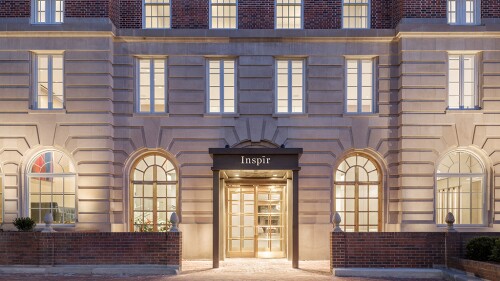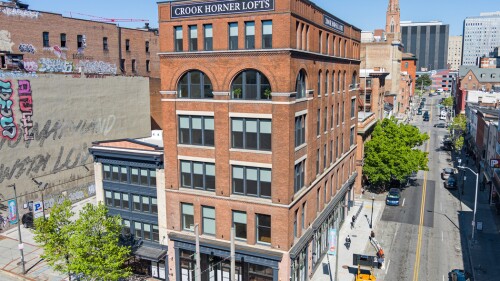Gentrification is more than a buzzword; itis part of a complex set of issues that affects the past, present, and future of cities throughout the United Statesand the developed world. The real estate industryis part of the problem, and it can be part of the solution.
Using a facilitated conversation format honed at previous ULI meetings, the “fishbowl” at ULI’s Fall Meeting in Washington, D.C., brought together 12 experts to discuss the natural tension between cities’ need to encourage housing and economic development—and the community backlash that often results from specific proposals.
This tension is highly evident in the U.S. capital, as explained by Evan Goldman, a vice president at urban housing developer EYA. Goldman presented a case study that, in his words, “made me question my beliefs about community engagement.”
In the District of Columbia’s rapidly regentrifying Brookland neighborhood, home to Catholic University and many religious institutions, EYA was approached by one of the area’s oldest seminaries, in need of raising capital to maintain their building and continue their social mission. As it had done years earlier with another nearby seminary, EYA proposed townhouse construction on part of the site, allowing the seminary to keep and maintain its large building.
We met with key stakeholders and proposed a plan for 150 to 180 two- to four-bedroom townhomes, attainably priced at $500,000 to $600,000, with 10 percent affordable units. Members of the community became aware of the potential project and immediately, opponents organized, created an email listserv, posted flyers, and in some cases distributed disinformation. Goldman recalled.
The first large community meeting about the project was contentious, with many supporters too intimidated to speak. After more than 30 additional meetings with neighborhood stakeholders, EYA devised a compromise plan with 80 three- to four-bedroom homes and a greater percentage (but fewer total units) of affordable housing. In addition, EYA agreed to fund a playground and a bike share station, obtain historic designation for the main seminary building, preserve in perpetuity three acres (1.2 ha) of open space in front of the building, create a fund to help low-income existing home-owners pay their property taxes, work with local contractors, involve local students in construction, and more. Twelve months later, the new plan received unanimous approval from the ANC and the District government.
But that approval was appealed, and as a result, the project has been held up in court for the past two years. EYA has spent eight years and still have not been able to break ground, Goldman said.
“All this is happening while the city has a critical housing shortage, especially for affordable and middle-range homes,” he said. “While there is a deficit of hundreds of thousands of units, tens of thousands of units all over the city are being delayed.” Ironically, he added, socially liberal residents often lead the charge in opposing market rate and affordable housing that could help to solve the housing shortage and enhance the economic health and growth of their neighborhood.
Against that backdrop, the “fishbowl” discussed how developers and residents can find common ground. “There should not have been the need for a leak,” posited Don Edwards, chief executive officer and principal of Justice and Sustainability Associates, a Washington, D.C.–based alternative dispute resolution and civic engagement firm. “Talk to us about your ideas before doing a concept drawing. Many neighborhood residents are the descendants of slaves and as such have a significant trust deficit.”
Community history plays into the process more than developers may realize, according to participants. Developers in any city must overcome the fact that zoning developed to create certain zones for certain people, explained Edwards. “This is not ancient history; it’s just one or two generations back,” he noted.
Added former Advisory Neighborhood Commissioners Adrian Jordan, “Change is scary, and although opponents are a vocal minority, supporters don’t want to make enemies of their neighbors.”
Nina Albert of the Washington Metropolitan Area Transit Authority suggested having systems for people to account and record their history, and safe spaces to come together and “collide,” such as the multifunctional Busboys and Poets restaurants in the District and suburban Maryland and Virginia, founded by panelist Andy Shallal.
Confronting and embracing communities’ histories can bring up seemingly insurmountable challenges. “The problem is more systemic,” said Shallal. “We have a serious issue with poverty. We need to start talking about the ‘R word’—reparations. Look at the city’s history, with policies like redlining; much of our population is too poor to afford even ‘affordable’ housing. We should be making a real commitment that people won’t be displaced by new development.” Added A.J. Jackson, executive vice president for social impact investing for JBG Smith, “You just have to give low-income people more money.”
“This is really a discussion about justice,” said Edwards. “We are dealing with a history of policies that have been proxy and code for white supremacy. Why do we even talk about housing affordability? Because housing is not a right.” The legacy of racial injustice has a long reach, added D.C. Office of Planning director Andrew Trueblood, citing the 15-year-gap in life expectancy between residents of the city’s poorest and most affluent wards.
Noted panelist Robert McCartney, Washington Post senior regional correspondent, “A big part of this problem is educating the public to appreciate the moral advantages of economic development. My tribe of affluent, liberal white people loves the idea of doing more for affordable housing, but there is immediate pushback to the idea of creating such housing in their own neighborhoods.”
“We need to seize the moment,” said Hans Riemer, councilmember-at-large of the Montgomery County (Maryland) Council. “Trump has coalesced the progressive community. This is the moment to educate people about the history of zoning as a tool to create segregation.”
“We also need to talk about wealth building,” said Ilana Preuss, founder and chief executive officer of Recast City, a community development and planning consultant. Even in Montgomery County, one of the nation’s wealthiest counties, African Americans and Latinos are more likely than whites to be earning less than $50,000 per year. “We will never be able to build enough affordable housing to solve our housing crisis,” Preuss said. “We need to build more wealth to allow communities to build their own wealth.”
Looking toward the future, urban planner and writer Dan Reed questioned why immediate neighbors are able to essentially veto proposed projects, deciding what type of housing is built in their neighborhoods and what kind of people will live there.
“It’s clear that the PUD [planned unit development] process is broken,” said Cheryl Cort, policy director for the Coalition for Smarter Growth. “It was designed to bring the community into the discussion, but it’s too vulnerable to the actions of just one grumpy homeowner who can prevent development of 90 new affordable housing units.”
Added Edwards, “We need a different development process in which developers are not penalized because they work with communities. We’ve got to figure out a different way to engage people in defining or redefining the American Dream. I am dismayed we have all these court cases. It means that we are not developing the partnerships we need.”
McCartney pointed to ULI’s work and others’ studies calling for more effective public/private partnerships in which each sector must make more financial sacrifice: the private sector must accept lower returns, while government must provide subsidies for the poorest third of the population. “The money has to come from somewhere, and we are getting no help at all from the federal government,” he said. “So, the money will come from other priorities or higher taxes, and then it becomes political.”
“It seems we can always find money when we need to do something,” concluded Shallal. “I have proposed a 1 percent reparations fund as a line item to repair centuries of injustice. In our city’s nearly $16 billion budget, that’s $160 million to go directly toward fixing some of the ills we have talked about.”




